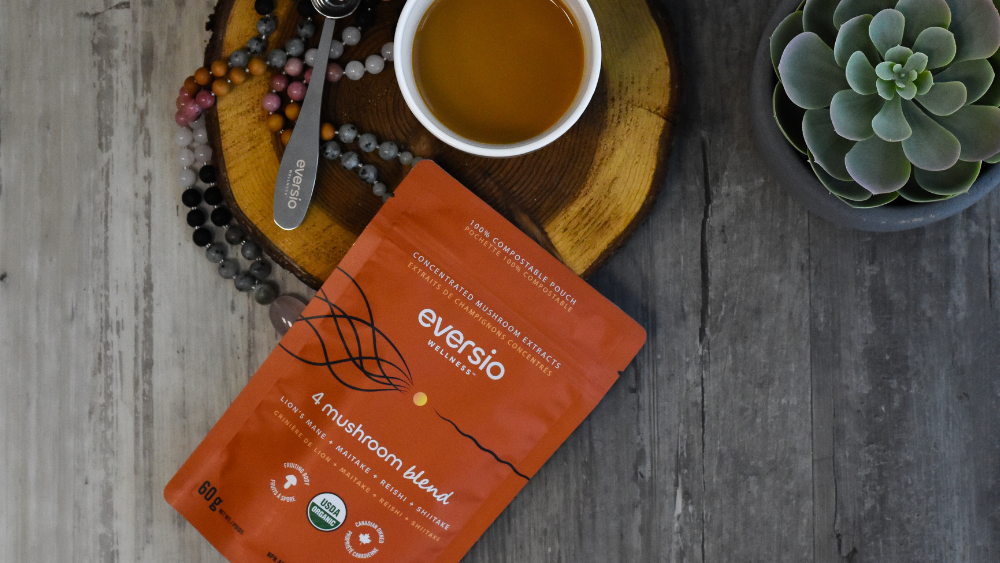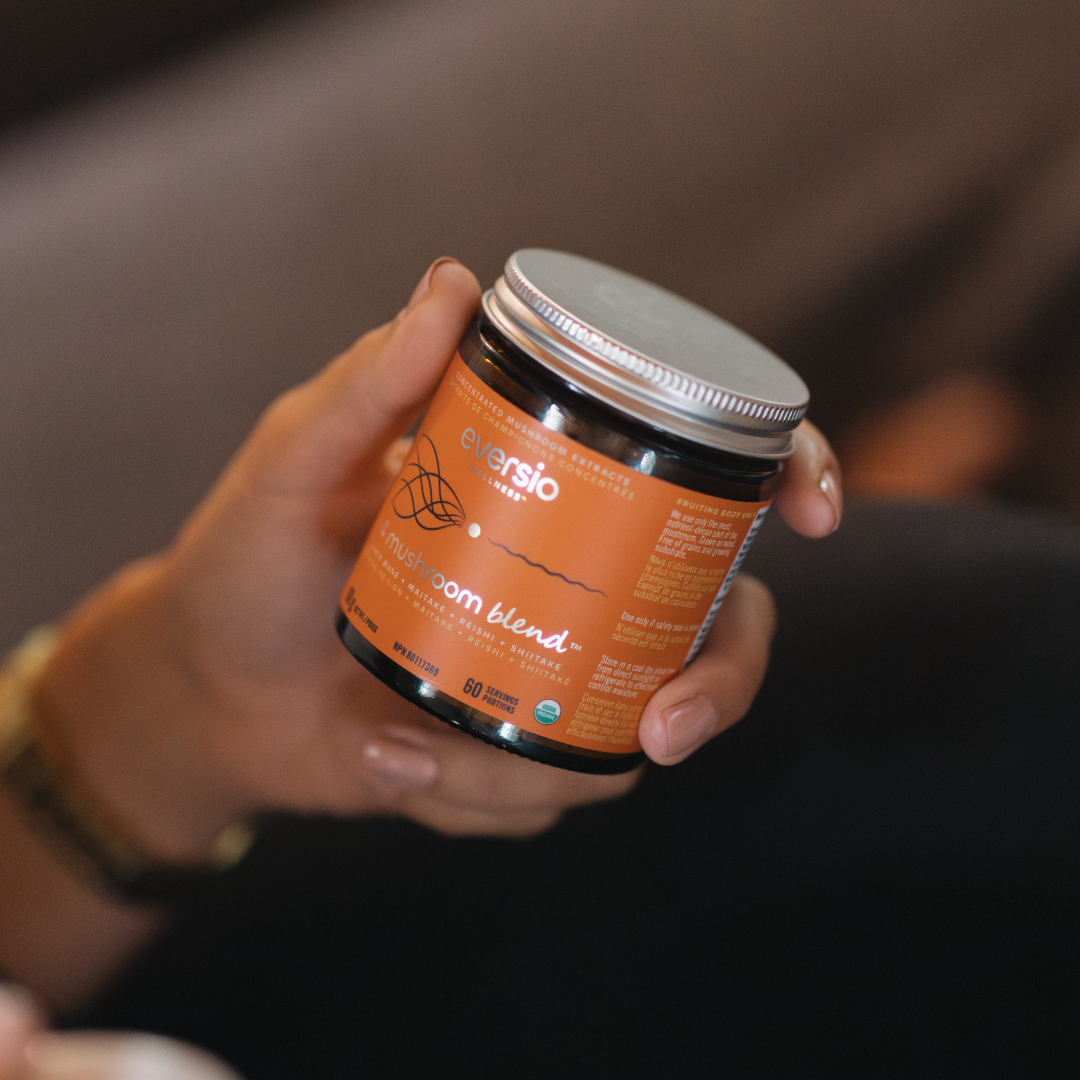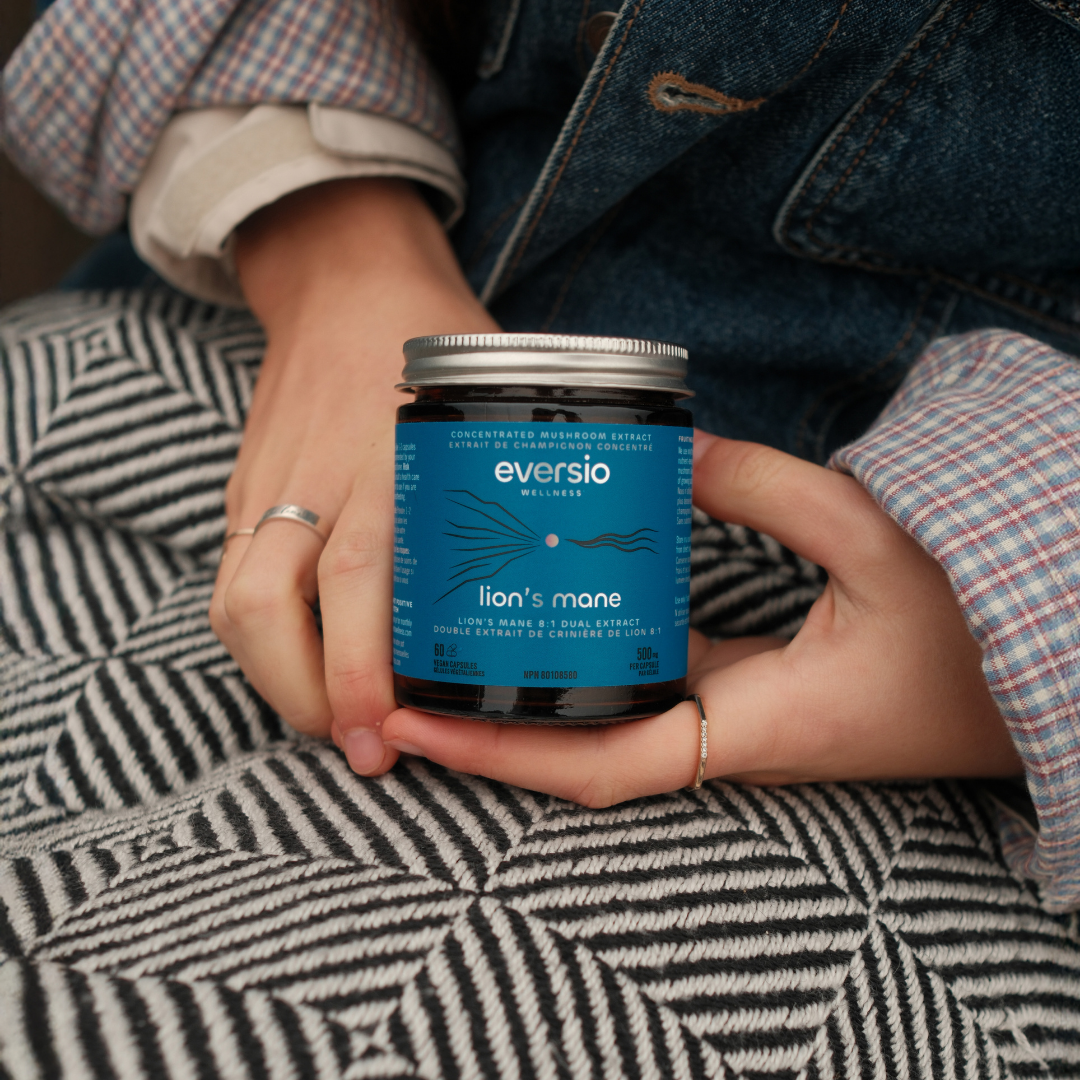June 9, 2025 | by EVERSIO WELLNESS
Functional mushrooms are a group of fungi used for thousands of years in traditional medicine practices to promote health and wellness. Functional mushrooms have garnered attention in recent years due to their potential health benefits, including immune-boosting effects and the ability to enhance natural immunity and reduce inflammation.
These healing mushrooms contain various bioactive compounds, including beta-glucans, terpenoids, and polyphenols, which are believed to be responsible for their therapeutic effects, making them immune-boosting mushrooms. There are many types of mushrooms, but we will discuss the immune-boosting effects of some of the most evidence-backed mushrooms.
How do Functional Mushrooms Enhance the Immune System?
Research on functional mushrooms has illustrated their versatile immune-boosting properties. The main active compounds in immune-boosting fungi responsible for their immunomodulatory effects are beta-glucans, complex polysaccharides found in the cell walls of many mushrooms. Specifically, beta-glucans are a type of polysaccharide that have demonstrated metabolic and immunomodulating properties, including anti-cancer, anti-bacterial, and anti-viral actions [1].
The beta-glucans present in mushrooms differ from other sources as they are structurally unique and recognized by receptors located on the surface of immune cells; thus, certain functional mushrooms have greater bioactivity and specific immunomodulatory properties that other sources of beta-glucans do not [1]. Due to this, functional mushrooms have been labelled as natural biological response modifiers (BRMs) because they can alter immune responses in the body [1].
One example of how beta-glucans may enhance the immune system is through their interactions with specific immune cells. Macrophages are specialized cells in the human body that play a crucial role in detecting and destroying bacteria and other harmful organisms. These immune cells, along with many others, carry specific receptors for beta-glucans, such as Dectin-1 and TLR-2 [1].
Dectin-1 is the most abundant receptor, and its activation stimulates processes that lead to the death and elimination of pathogenic microorganisms that may invade the body [1]. Additionally, it stimulates the production of cytokines, which are crucial in controlling the growth and activity of other immune and blood cells [1].
In addition to beta-glucans, other compounds found in functional mushrooms for health, such as terpenoids and polyphenols, have been shown to have anti-inflammatory and antioxidant effects, further supporting the immune system and protecting against disease [2]. Overall, the scientific evidence suggests that functional mushroom benefits may help support the immune system, reduce inflammation, and promote overall health and wellness.

What are the Health Benefits of Functional Mushrooms?
Functional mushrooms are believed to offer a wide range of health benefits due to their various bioactive compounds, including beta-glucans, terpenoids, and polyphenols. These compounds have been shown to have immunomodulatory, anti-inflammatory, and antioxidant properties, which are thought to contribute to the potential health benefits of functional mushrooms. Studies have suggested that functional mushrooms may also have neuroprotective effects and may help to reduce symptoms of anxiety and depression [3].
Certain functional mushrooms, such as Turkey Tail and Lion’s Mane, have also demonstrated anti-tumour effects, potentially through their ability to boost the immune system’s activity against tumour cells and prevent the development of an environment that would favour cancer progression [3]. Additionally, natural exercise mimetic mushrooms, such as Cordyceps, have been shown to improve physical performance and endurance while having organ-protective effects [3].
What are the Best Mushroom Supplements to Support Immunity?
Considering all the potential health benefits of mushrooms, it is challenging to identify a specific species of fungi as the best for health maintenance. With all the various types of mushrooms, everyone will likely find the one that suits them most and makes them feel their best. Let’s take a look at what the research says about a select few functional mushrooms!
Reishi Mushroom Benefits (Ganoderma lucidum)
Reishi contains two constituents that may greatly benefit the immune system; the beta-glucans are immunomodulatory, while the triterpenoids have strong anti-viral properties [4].
As mentioned, the immune-boosting benefits of mushrooms are highly attributed to the beta-glucans as they have illustrated the ability to interact with immune cells, such as macrophages. In addition, beta-glucans also have a relationship with TLRs (toll-like receptors), which are another common receptor of the immune system involved in the early stages of infection, as they initiate the innate immune response.
When beta-glucans bind to TLRs, this can activate the innate immune system and induce the production of essential cytokines crucial in controlling the growth and activity of other immune cells [5]. The ability of beta-glucans to interact with these immune cells is significant, as it illustrates the capacity of Reishi to target bacteria, viruses, and even cancer cells.
Cordyceps Mushroom for Immunity (Ophiocordyceps sinensis)
Increasing evidence shows that Cordyceps is a bidirectional modulator with potentiating and suppressing effects on the immune system by regulating innate and adaptive immunity [6]. Innate immunity is the body's first line of defence against pathogens and is present at birth. It is a non-specific response that targets a wide range of pathogens but lacks specificity. Adaptive immunity is a slower but more specific response that is activated after the innate immune response has failed to clear the pathogen, and it develops long-term immunity against pathogens that have been encountered previously.
Turkey Tail Mushroom Benefits (Trametes versicolor)
Turkey Tail mushroom is one of many fungi highly researched for its robust qualities, as it is full of antioxidants and immune-boosting complexes [7]. The most studied and biologically active compound found in Turkey Tail is Polysaccharide K (PSK), an approved adjunct to cancer treatment in Japan, where its use is recognized for strengthening the immune system and improving longevity in cancer patients [8].
However, the fungus as a whole has been shown to enhance innate and adaptive immune responses [9], meaning its use allows us to reinforce our body’s first and second lines of defence against pathogens.
Shiitake and Maitake Mushroom Immunity
Maitake and Shiitake mushrooms have also illustrated immune-enhancing effects, individually and in combination. One study stated that the two functional mushrooms significantly stimulated defence reactions and strongly stimulated the cellular and humoral branches of the immune system [10]. In combination, the two mushrooms enhanced the production of cytokines necessary for a robust immune response and defence [10].
Lion’s Mane Mushroom and Immunity (Hericium erinaceus)
Although most known for its neurotrophic and neuroprotective effects, Lion’s Mane has also established itself as a potential anti-cancer agent. Cancer development in our bodies lies in a process in which DNA may become damaged and result in unregulated division and replication of cells.
Polysaccharides are a significant component of Lion’s Mane and have been researched to hold anti-cancer properties. One specific polysaccharide, HEG-5, was studied and found to inhibit the proliferation and formation of human gastric cancer cells by promoting programmed cell death and cell cycle arrest, which would assist in preventing the uncontrollable replication of cells that results in cancer [11].
Another study found that an extract of the fruiting body of a Lion’s Mane could also induce programmed cell death, but this time, it was found in human leukemia cells [12].

How to Support Immune System with Mushrooms
When using functional mushrooms for immune support, it is essential to choose a high-quality product that is ideally a 100% fruiting body extract, such as the ones produced by Eversio Wellness. One of the most effective ways to use functional mushrooms is to consume them as mushroom extract capsules or powders, as these would provide more concentrated doses of bioactive compounds.
Mushroom extracts for immune health can be incorporated into any part of your daily routine and can easily be added to your morning coffees or teas. Two capsules daily can be taken with breakfast for those who don’t mind consuming capsules. If you are interested in more recipes, take a look at the “Recipes” page on Eversio Wellness’ website.
In addition to taking functional mushrooms as a natural way to boost immunity, it is also important to maintain a healthy diet and lifestyle to support the immune system. This includes eating a balanced diet rich in fruits, vegetables, whole grains, and lean proteins, as well as regular exercise, managing stress, and getting enough sleep. By combining the use of functional mushrooms with a healthy lifestyle, you can help to support your immune system and improve your overall health and well-being.
What’s the Best Mushroom Supplement for Immunity?
Determining the best mushroom supplement for immunity involves considering various factors, including the specific type of functional mushroom and the desired health benefit. When selecting a mushroom supplement, it is crucial to evaluate the product's quality, including the source and purity of the mushrooms. Additionally, consider the form of the supplement, such as a capsule, extract, or powder, as well as the recommended dose. Ultimately, the best mushroom supplement for wellness depends on your needs and health goals.
If you’re considering immune system support with mushrooms but are having difficulties deciding which one, take a look at this page from Eversio Wellness that gives a great breakdown of which mushroom may be the best fit for you.
We hope you have found this article informative. If you have any questions or comments, please leave them in the comment section below!




















Leave a comment
All comments are moderated before being published.
This site is protected by hCaptcha and the hCaptcha Privacy Policy and Terms of Service apply.